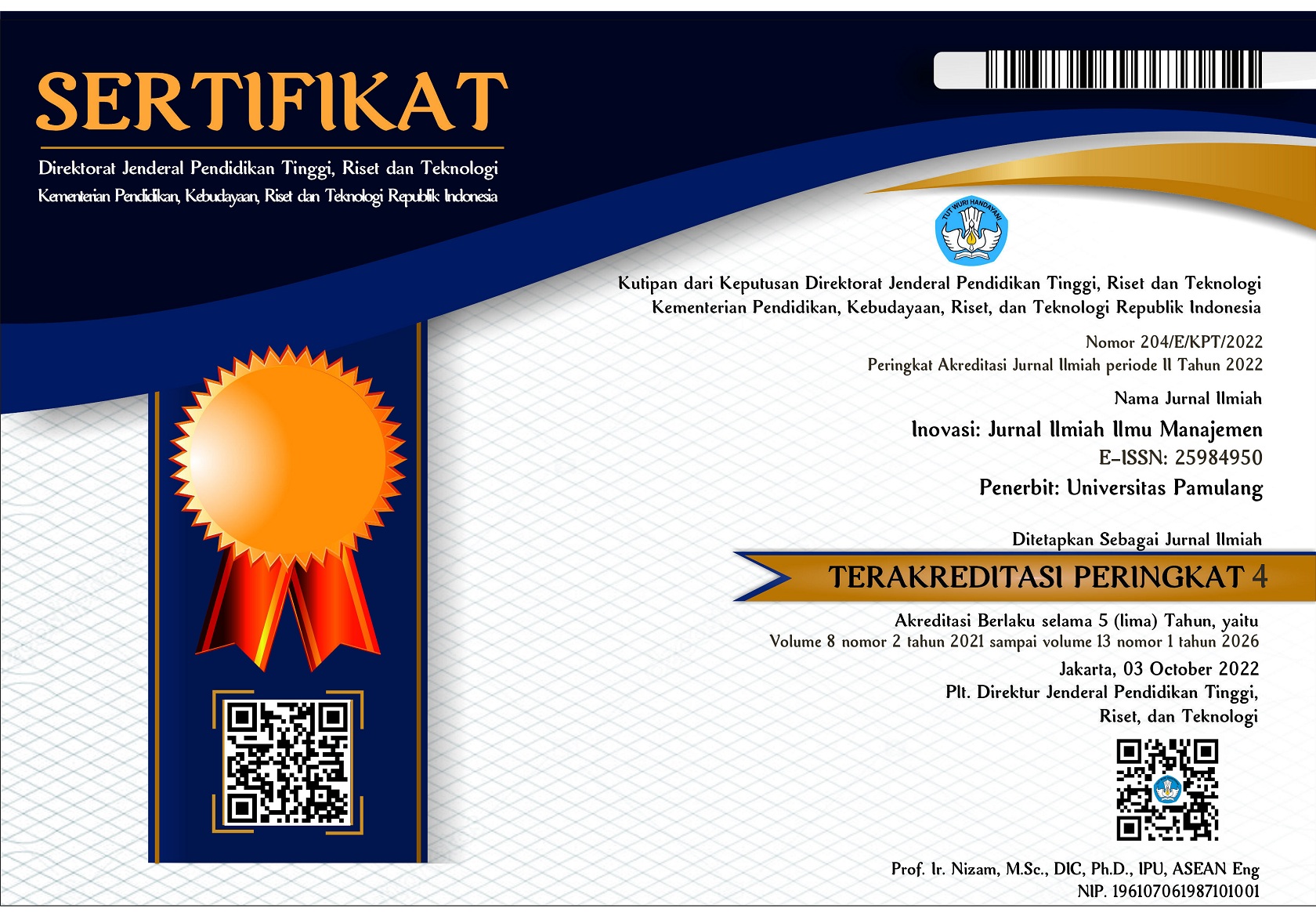ANALISIS PENGARUH PERAN KEPEMIMPINAN DAN BUDAYA ORGANISASI TERHADAP MOTIVASI KERJA YANG BERDAMPAK PADA PENINGKATAN KINERJA KARYAWAN (STUDI KASUS PT. PUTRA CITA NUSA)
DOI:
https://doi.org/10.32493/Inovasi.v4i1.p%25p.553Abstract
ABSTRAK
ANALISIS PENGARUH PERAN KEPEMIMPINAN DAN BUDAYA ORGANISASI TERHADAP MOTIVASI KERJA YANG BERDAMPAK PADA PENINGKATAN KINERJA KARYAWAN PADA PT. PUTRA CITA NUSA. Penelitian ini bertujuan untuk mengetahuipengaruh peran kepemimpinandanbudayaorganisasiterhadapmotivasikerjayang berdampak pada peningkatan kinerja karyawan. Pada penelitian ini,variabel independen yaitu peran kepemimpinan (X1) dan budaya organisasi (X2), sedangkan variabel dependen adalah motivasi kerja (Y) yang berdampak pada peningkatan kinerja karyawan (Z).Penelitian ini dilakukan kepada 57 responden dari 130 populasi yang ada. Hasil penelitian menunjukkan bahwaperan kepemimpinan (X1)berpengaruh signifikan secara parsial sebesar 40,6% terhadap motivasi kerja (Y), budaya organisasi (X2) berpengaruh signifikan secara parsial sebesar 45,1% terhadap motivasi kerja (Y) dan motivasi kerja (Y)berpengaruh signifikan secara parsial sebesar 39,5%kinerja karyawan (Z) serta sisanya diterangkan oleh variabel lain.Hasil penelitian regresi berganda menunjukkan bahwa peran kepemimpinan (X1) dan budaya organisasi (X2) terdapat pengaruh signifikan secara simultan sebesar 49,3% terhadap motivasi kerja (Y) yang berdampak pada peningkatan kinerja karyawan (Z), sedangkan sisanya sebesar 50,7% diterangkan oleh variabel lain yang tidak diajukan dalam penelitian ini.
Kata Kunci : Kepemimpinan, Budaya Organisasi, Motivasi Kerja dan Kinerja.
ABSTRACT
ANALYSIS OF EFFECT OF THE ROLE OF LEADERSHIP AND ORGANIZATION CULTURE TO WORKING EMPLOYMENT MOTIVATION IN ENHANCING PERFORMANCE OF EMPLOYEES AT PT. PUTRA CITA NUSA. This study aims to determine the influence of leadership roles and organizational culture on work motivation that impact on improving employee performance. In this study, independent variables are leadership roles (X1) and organizational culture (X2), while the dependent variable is the work motivation (Y) which has an impact on employee performance improvement (Z). This study was conducted to 57 respondents from 130 existing population. The result of the research shows that leadership role (X1) has a significant influence partially 40,6% toward work motivation (Y), organizational culture (X2) has a significant partial effect of 45,1% to work motivation (Y) and work motivation ) Partially significant effect of 39.5% employee performance (Z) and the rest is explained by other variables. The result of multiple regression research shows that leadership role (X1) and organizational culture (X2) have a significant influence simultaneously equal to 49,3% to work motivation (Y) which impact on employee performance improvement (Z), while the rest equal to 50,7% Explained by other variables that are not proposed in this research.
Keywords: Leadership, Organizational Culture, Work Motivation and Performance.
Downloads
Published
How to Cite
Issue
Section
License
Authors who publish with this journal agree to the following terms:
- Authors retain copyright and grant the journal right of first publication with the work simultaneously licensed under a Creative Commons Attribution License that allows others to share the work with an acknowledgement of the work's authorship and initial publication in this journal.
- Authors are able to enter into separate, additional contractual arrangements for the non-exclusive distribution of the journal's published version of the work (e.g., post it to an institutional repository or publish it in a book), with an acknowledgement of its initial publication in this journal.
- Authors are permitted and encouraged to post their work online (e.g., in institutional repositories or on their website) prior to and during the submission process, as it can lead to productive exchanges, as well as earlier and greater citation of published work (See The Effect of Open Access).
INOVASI: journal of managenet have CC-BY-SA or an equivalent license as the optimal license for the publication, distribution, use, and reuse of scholarly work.
In developing strategy and setting priorities, INOVASI: JOURNAL OF MANAGEMENT recognize that free access is better than priced access, libre access is better than free access, and libre under CC-BY-SA or the equivalent is better than libre under more restrictive open licenses. We should achieve what we can when we can. We should not delay achieving free in order to achieve libre, and we should not stop with free when we can achieve libre.









